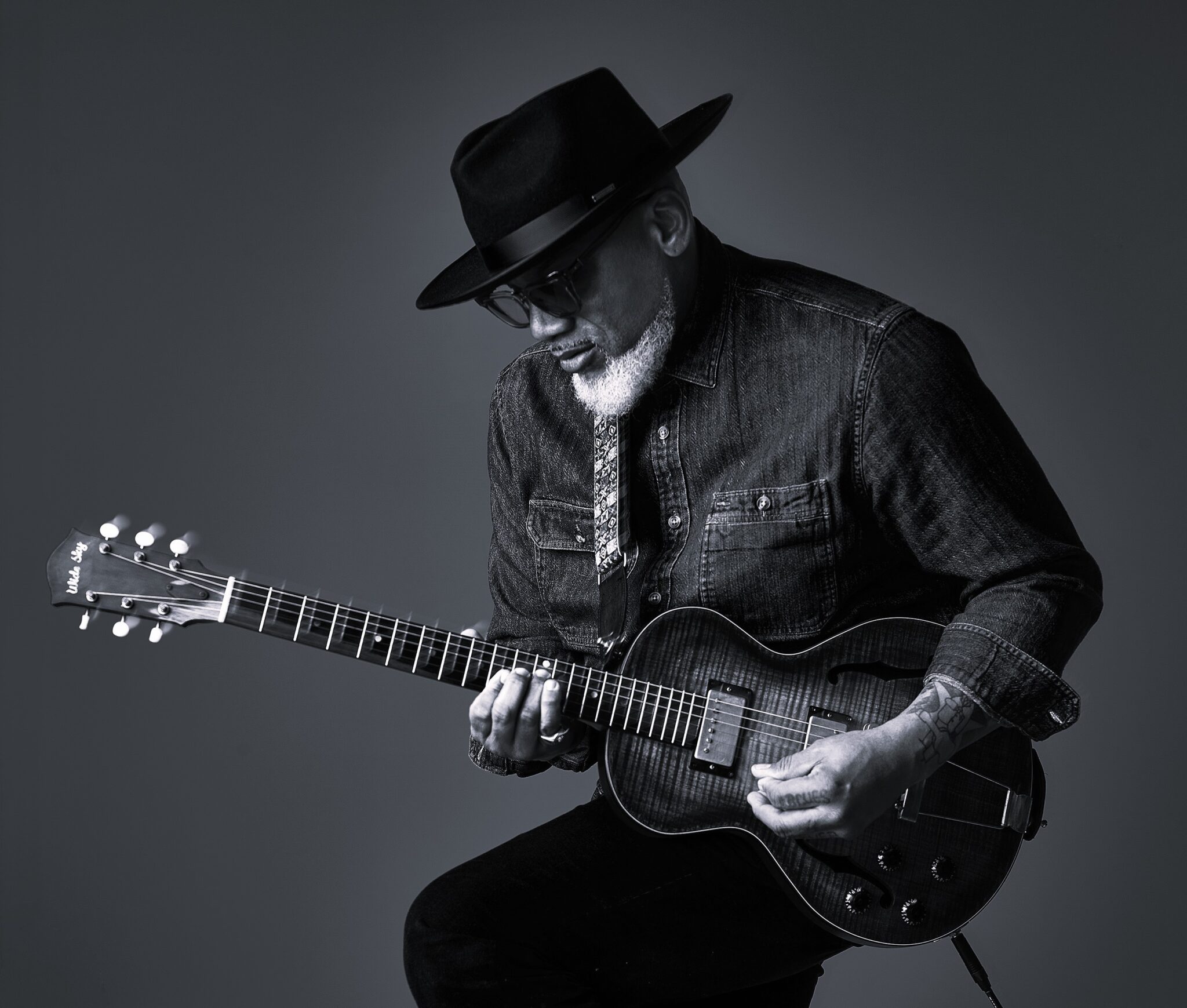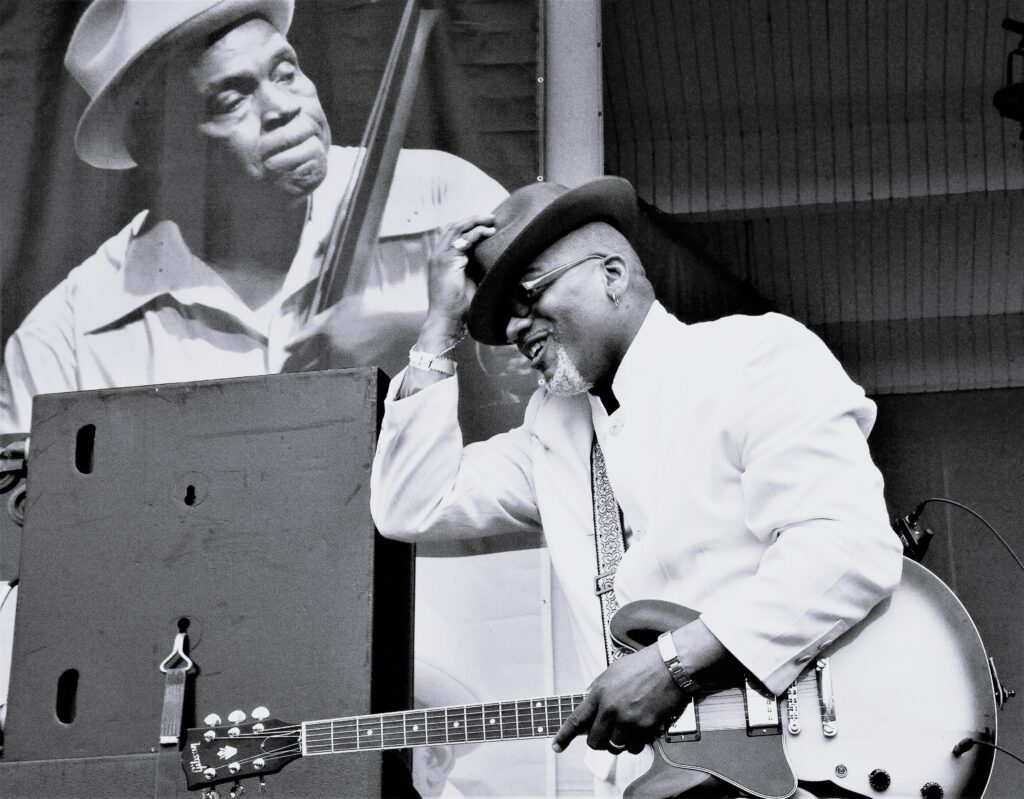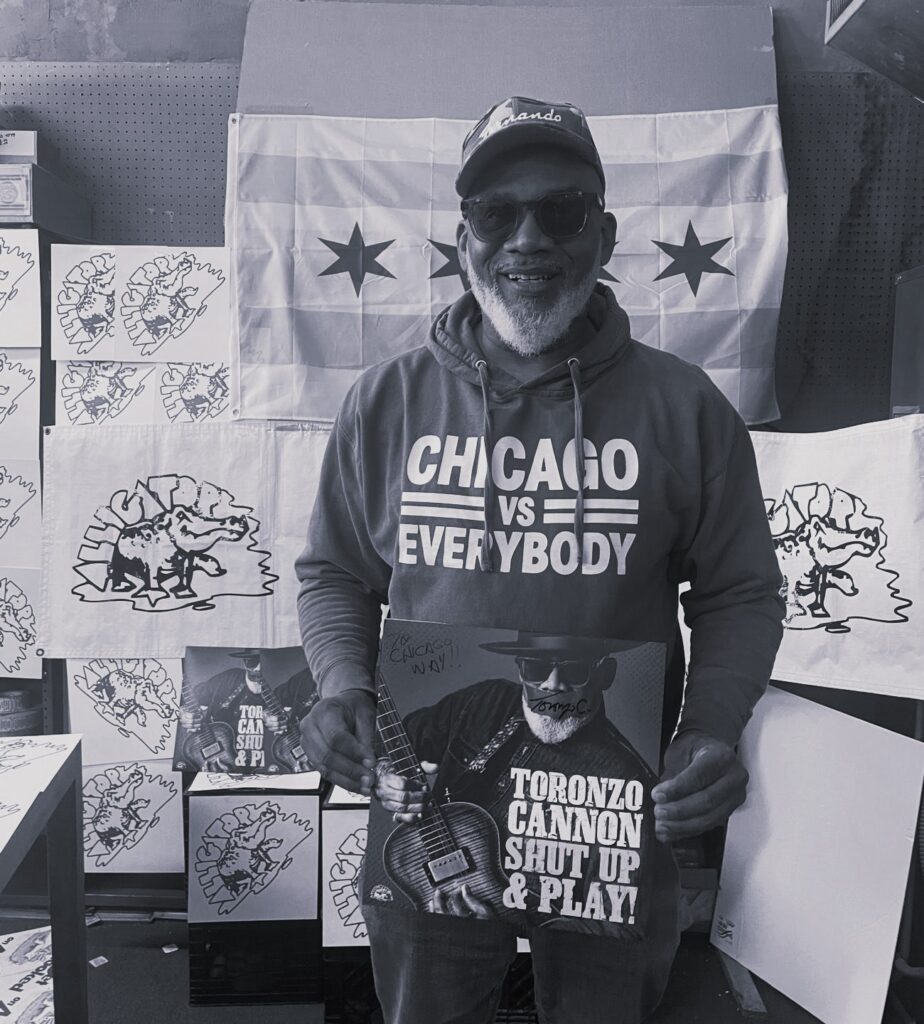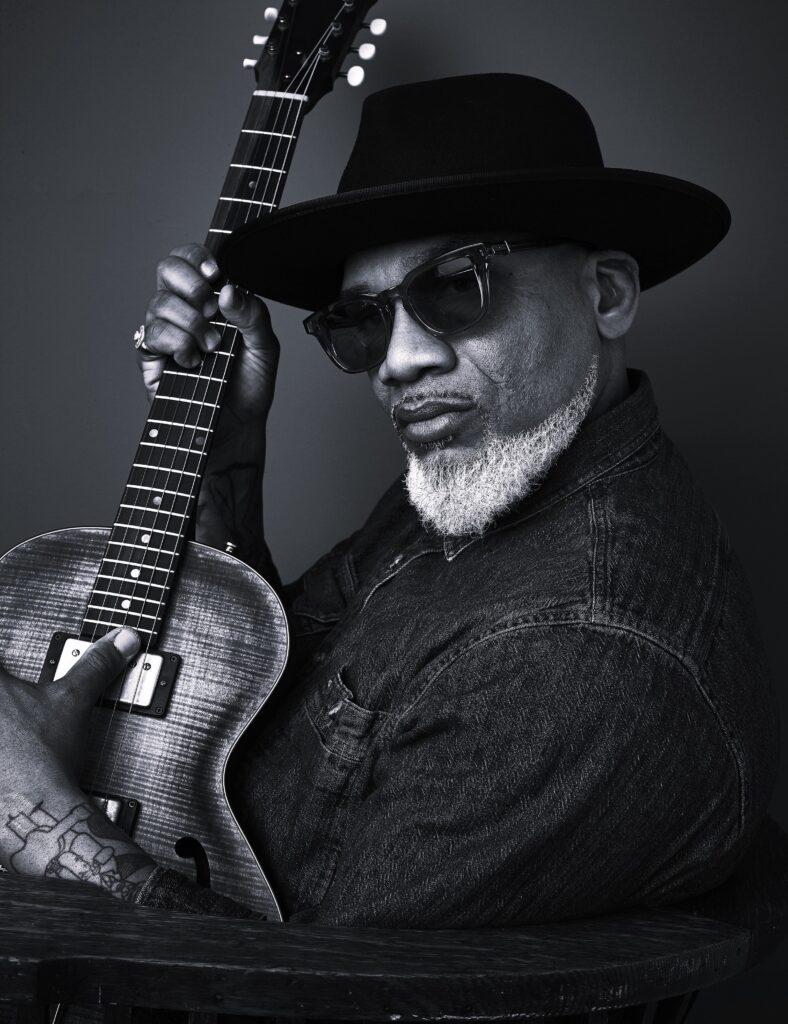Chicago On My Mind
by Matteo Bossi
We published an interview with Toronzo Cannon almost ten years ago, on issue n. 134 of Il Blues. He was making a name for himself on the Chicago blues scene after a couple of very promising records on Delmark and he had just signed a deal with Alligator. A decade or so later, his place on the scene is secured and this early June comes out “Shut Up And Play” his third album for Bruce Iglauer’s label. We have had the chance to talk about it with him in the course of a long video conversation. Toronzo, who has retired after twenty seven years as a bus driver for Chicago Transit Authority, is driving his car and he pulls over to talk, showing the same warmth and sharpness we find in his songs.
“Shut Up And Play” is your third album for the label and you’re at the forefront of the Chicago blues scene. How does it make you feel?
It is humbling, it makes me want to be better. It doesn’t distract me, my focus has always been to be part of the Chicago blues scene, a movement…Buddy Guy is the man, but I’m proud to represent Chicago, the city, not just myself. That’s where I come from spiritually, in my heart and in my music, every time I go to a gig I’m thinking about representing the city. And sometimes when I talk with Bruce (Iglauer) he reminisces about all my heroes, Albert King, Hound Dog Taylor, Albert Collins…little anecdotes and conversations with me about blues heroes for many that he’s encountered, because you know he’s been in the business for 56 years or whatever. So he has encountered all these great blues musicians that we just read about, he’s done deals with them!
Since you mentioned Albert King, a guy who played with him just passed away, Donald Kinsey. He played reggae too, like you. Were you friends with Donald?
Yes, but I didn’t know he played reggae until after I got into the blues scene. Then I started knowing more. I knew of the Kinsey Report and the family band, but I didn’t follow his particular history until I met him and then I was like, -oh that’s the guy who played “Johnny B.Goode” on that Peter Tosh album, he played with Bob Marley too and Albert King! – I was learning all these things after. Then we became friends. The first time I realized that we were cool he came to one of my shows and normally musicians dont’t do that. Or they kind of say they will but never show up. But I was playing at Rosa’s and he popped up and saw one of my shows he didn’t have a guitar with him, but it was cool that he came out, you feel validated.
You were friends with Reverend John Johnson owner of the Maxwell Street Blues Bus who passed also a few a years ago.
Reverend Johnson I knew him for a long time, he gave my first talk, you know when an older gentleman sees something in a younger player. I was playing in Maxwell Street with a few friends and he saw my style of playing and it was almost like a grandfather talking to his grandson. Ha said I want to give you something, a present, and he gave me a CD by Luther Allison “Live in Montreux, “Where Have You Been?”, I think it was 1999 or 2000. At that point I didn’t know who Luther Allison was but I heard it and I was a Luther Allison follower ever since, because of Reverend Johnson giving me that CD. Again now I’m in the Alligator family which was home for Luther Allison also. It’s a great memory, a full circle moment. It’s been 25 years from then and it was one of those things I’ll never forget. He saw something in me that I didn’t know I had. He wanted to get the bus back, he wanted me to sign some papers for it but it never happened, they located the bus but a deal could not be worked out to revitalize it.
Talking about the new album, how many times people have said to you to “shut up and play”, to quote the title?
(laughs) Well, for me it’s not about what I’m saying, but my politics…some people don’t want to hear what gives you the blues. They just want to hear the blues. But I’m going to put in a song the reason why I get the blues. Sometime you have to put the medicine inside the candy! Not to trick the listener but to let them see the forest for the trees, you. You can’t ask for me to be a bluesman and musician and to tell you my stories of love, loss and things in my life that I regret, but you don’t want to hear it when I’m speaking it. But now that I put it in a song, maybe you’ll hear me. There’s a difference between listening and hearing. You can listen to the birds but do you hear the birds?. Same with music. People just listen to music, they sing along to a nice little melody or something, but then when you write a song where people have to hear the lyrics, not just listening, that’s when you get deeper into the mind and make them think, hopefully they realize they’ve been wrong in some ways. Or to justify what they have already been thinking. Some people will call that a protest song but it’s only a protest song if you disagree with it! Good or bad, if you agree or disagree with some of the lines in my songs once I put the music out there, they’re not mine anymore, it’s for the listener.
You’ve got songs like “Can’t Fix The World”, “Shut Up And Play” or “Insurance” in the previous album and lines like “no 40 acres for my family when they set us free”…that shows your storytelling way.
Yes and I’m not making up any wild fantasy story, it’s all documented, I’m not trying to cover up what America has done. That’s what they’re trying to do now, they’re banning books that have african-american history in them, because they don’t want to look bad in the face of their children. So they think this drives the hate in America. But history is what it is. How can you learn if you don’t want to feel bad? You try to do better, but if you don’t want to do better that’s when you try ho hide things because you’re ashamed of your history. And you might do it again and by banning books so I can’t teach my children or grandchildren about african-american history and what we mean to this country, by doing this they’re not helping the situation with the races. If you do this you’re making me a second class citizen all over again. I would not be a honest person or bluesman if I didn’t write songs like that. They have to be brought out, other the “my woman left me or my woman didn’t put food on the table”…there’s more blues than that. That’s why I wrote a song like “Insurance”.
Or “Message To My Daughter”, a very personal song.
There has been some that said that song shouldn’t be on an album, it’s too personal. For me I’m like, once again, the essence of the blues is to sing out your troubles. How can you tell me, as a father, that I can’t make an appeal to my daughter in a song while going through a divorce? Other men, and women too, are going through divorces so it’s not like I’m the only one…this person thought it was too personal and she was trying to silence my voice, but it didn’t work. I’m glad that I’m writing songs that other people can relate, other than “I’ve got no money” or “we got to party all night long”, there’s too much of that. We need songs with substance, that sticks with you. That’s what I want my album to be.
Is writing a song like a craft you keep refining? Has your songwriting process changed over the years?
I think sometimes you can find better ways to deliver the message, the more that you’ve been doing it. Before Alligator Delmark let me do songs that can go for six of seven minutes, they have a sensibility as a jazz and blues label and let the artists go wherever they want to go. As jazz artists do. When I got with Bruce, he made it more self contained. He said “how can you make that line stronger but with not that many words”? He would give me challenges like that. And to me it made me more refined and to think in a different way. When I would write a verse I’d think “what would Bruce say”? It made me tighten my lyrics, use less words. Bruce comes from the day where you do tight three minutes songs to be played on the radio, even though he let me go crazy on “Shut Up And Play”, the song. He said “I’m gonna let you control that”. My writing has matured, not falling into the same trap.
You play acoustic songs on your records. Have you ever thought about doing a whole acoustic album?
Yes! Even my Delmark songs, when I listened to some of them and I think those were valid songs. I don’t even do those songs anymore. If I was to do it I’d like to practice a real tight acoustic set of maybe ten of my songs and have maybe another guy play acoustic with me. The less instruments the more the story pops up and shine. I can flirt with time a little bit better not having a drummer, bass or keyboard pushing me…slow it down. An unplugged, like MTV used to do, telling the stories behind the songs…I would love to do that!
You retired from your day job as a bus driver for CTA a few years ago, that was obviously a big change for you?
It was, because I was retiring and going through a divorce at the same time. I wasn’t happy of the space I was living in at the time…a lot of things were happening. And it was probably the main reason why it took me so long to write this album. I thought adversity would made me do write and album fast. But the big change for me was not knowing what my future was going to be. There’s gonna be money loss, there’s gonna be feelings I had to repair with myself, my daughter and my ex wife. When you break up with somebody it’s not like it’s over, you have to be on a respectful level with people you’ve spent many years with or you have children with. Getting myself right was the first thing to do, just being honest with myself. It was a process which propelled some of the songs on the album. The failed relationships…the song “Him” is about one woman. I was fortunate to complete my 27 years so I could retire and still have something I can rely to. Not having to wake up at five or six in the morning was great also.
How’s the situation in Chicago after the pandemic? Did any club close down?
Some of them closed, one other opened up just recently, Lee’s Unleaded on the south side. Other bars that didn’t have blues now include blues, other venues not exclusively blues now they have blues maybe on a Thursday night, they kind of soak up some of the attention that Chicago used to have, about the blues clubs.
You have Matthew Skoller on harmonica on one track, in the past you had Billy Branch or Joanna Connor, the guests on your records tend to be friends who you’ve played with before.
And Nora Jean Wallace, Carl Weathersby on my first album…right now I’d like to collaborate with Gary Clark Jr, he has become a friend and I would like to write a song for Shemekia Copeland and maybe play for her.
Shemekia has been singing some relevant songs too.
Yes and we’re not accusing anyone in our songs…considering I’m a dad of a daughter I’m always women conscious, being a dad girl, how I treat a woman and not to marginalize women. Hopefully we can spark something in a listener’s mind, I’m just doing my part, like Shemekia or Selwyn Birchwood. I would encourage my white peers in the blues to write songs about injustice from what you see in America, from what you see your black peers going through, and not just beer or barbecue or my woman left me…where are the blues allies musically? I see them in the audience. My white friends should write about what’s around them too. But if you think ratial policy is taboo in America or that you’re going to lose some fans then let me know where your heart is. Think about “What’s going on”? Motown was instrumental in the Civil Right Movement or the Staple Singers, Curtis Mayfield or Syl Johnson, “Is It Because I’m Black?”
Or even a guy I know you listened to when you were younger, John Mellencamp, he has written some topical songs.
Oh yes, even before reggae or blues I was listening to songs like “Rain On The Scarecrow”, records like “Uh Huh” or “The Lonseome Jubilee”…I was a big fan when he was still John Cougar, then he was John Cougar Mellencamp and then just John Mellencamp. He was one of my heroes, his acoustic stuff is great and he is an activist, what he did with Farm Aid…I want to meet him one day too. They tried to make him shut up and play, just recently during an acoustic song, he was talking about life, maybe about politics I don’t know, but someone in the audience shouted “just play the song” and he got angry! So they’re telling him too to shut up and play, it’s a universal thing. If the listener is uncomfortable and they don’t want to hear that, they just want to hear the song with the good memories, maybe the first date with a girl or whatever…but they don’t want to know where this song came from or what affects you to write songs like this. If they can tell Mellencamp or B.B. King to shut up because he reminisced too much towards the end of his life…I’m in good company.
Your grandfather and uncle used to hang out at Theresa’s Lounge, what would they say to you now?
I can tell you for a fact, because my mother says it to me, my grandfather would have been at every show of mine! He was so proud of me. Any family member who would do something. But I really started after he passed away. My mother reminds me of the type of spirit my grandfather had when it came to music…He came from down south. I wrote a song dedicated to him on the new album, “Had To Go Through It To Get To It”, it’s about his trajectory as an african-american coming to Chicago from the deep South, Mississippi, to make a better life for his family. He took care of me and all of us. I had to call my mother and ask her what year he did come to Chicago and she said in 1943…and I put it in the song. There comes a time when you’re self reflective as an artist, you write a song just as a person, your growth, your lineage and your family and try to put it in a song. Now after I retired I go through the city in an electric unicycle, I ride around in my old neighborhood, just reminiscing about the place where I grew up, I learned respect, fear, because I lived non in a great neighborhood…all of that made me who I am today. I’m a good man because I went through this. And if I can put that in a song maybe it would be therapeutic and helpful for other people too. If you’re honest with yourself it makes you breathe better, I have nothing to hide, the guy you see on stage it’s the guy who wrote the song. I’m not living in a kind of fantasy or playing a character. This is me.
With the passing of so many elders of Chicago blues in recent years, do you feel a responsibility towards the younger generation?
Yes and I always tell two things to the young musicians coming up, when they ask me what do they need to do to get to the next level, I say get a passport and write your own songs. Write what you know about. There was a young guy, his name is Hayden, I forgot his last name, he opened for me in New Jersey and he asked me for advice. About six months later I’m in France and he’s in the lobby of the hotel playing acoustic guitar. He told me I took your advice to get a passport. He’s getting press now. Another young lady named Alicia “Ya Yah” Townsend, and up and coming blues singer from Chicago, she asked me the same questions…and two months later she got a passport and a guy called Ivan Singh from Argentina wrote to her -do you have a passport? Can you get to Argentina? – And from my advice she went to Argentina for the first time. That’s my way of giving it back and trying to be present for the next generation, but I still have more songs to sing and to write too. I’m not there yet. About three months ago I was looking at a young guy at Rosa’s, he’s like 29 and I’m 56. I came to the show and I saw Jimmy Burns at the bar, he’s one of my heroes, he’s like 81 now and he probably was 54 the first time I saw him and I was in my early thirties. The story never ends. This young guy in 25 years he’s gonna be my age and I’m gonna be Jimmy Burns. The cycle of blues life. When I look at videos of Billy Branch, Lurrie Bell and Carl Weathersby…even of Buddy Guy sometime, I try to remember what age they were. I know Billy is 70 now, but when you see them in their forties and fifties it puts things in context. I’m trying to be part of this blues community, in twenty years I’m gonna be part of the folklore of Chicago blues, but hopefully they’ll know I was honest and respect the elders and do my part.












Comments are closed